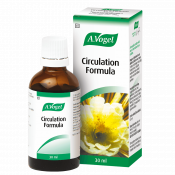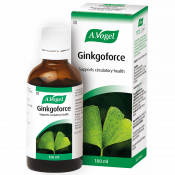The circulatory system is made up of 3 types of blood vessels:
- Arteries which carry blood away from the heart
- Veins which carry blood back to the heart
- Capillaries, the smallest blood vessels connect arteries to veins and feed our cells with oxygen
PROBLEMS WITH THE CIRCULATORY SYSTEM
Problems with the circulatory system can be serious and lead to major life-threatening health issues such as angina, heart attacks, strokes and blood clots. These conditions must be managed by your doctor.
Major circulation issues are often caused by blood vessel problems (like peripheral artery disease), or hardened and blocked arteries. They can also be caused by blood clots, and diseases such as diabetes.
There are also minor health problems, related to poor circulation, which can affect your health such as tinnitus, cold hands and feet and varicose veins. If you suffer from one of these minor conditions, there is often something you can do to help yourself.
In the section below, you can find out more about the causes, symptoms and treatment choices of some of the more common minor problems related to blood circulation.
General Symptoms of Poor Circulation
The first step in getting help is recognising your poor circulation symptoms, so that you can then pinpoint the underlying cause with your GP or specialist. So, what does poor blood circulation feel like and look like?
Symptoms:
• Sore or weak muscles
• Muscle cramps
• Skin that appears blueish in colour
• Abnormally cold extremities (fingers and toes)
• Bulging veins
• Numbness in your extremities
• Feeling 'pins and needles' or tingling
MINOR CIRCULATORY ISSUES
Tinnitus
This is a symptom, rather than a condition, with a number of causes. The term refers to hearing sounds or noises without an external source for the sound.
One of the simplest causes of tinnitus relates to exposure to loud noises or sounds such as being at a rock concert. Other common causes include ear wax and viral infections such as colds or flu. Read more about tinnitus.
Tinnitus Treatment
There is no cure for tinnitus, but there are ways to treat your symptoms. Some find that listening to music or playing white noise helps mask out the ringing sound. There are also in-ear devices you can use on a daily basis to mask out the noise. Speak to your audiologist about available options.
Since tinnitus can be caused by different things, your treatment may differ according to the cause. Common causes include earwax build up, poor circulation, hearing loss, and medication side effects.
Raynaud's syndrome - Cold hands and feet
Another commonly encountered minor problem of the circulatory system is having cold hands and feet.
Although one might say that in the deepest days of winter, everyone experiences cold hands and feet, people suffering from this problem may complain of the condition even during summer months.
There are two types of Raynaud's: Primary and Secondary Raynaud's. While the causes of the illness aren't fully understood, Secondary Raynaud's – the more serious form of the illness – is believed to result from different diseases, such as artery diseases, carpal tunnel syndrome, connective tissue disorders, and so on. Read more about Raynaud's syndrome.
Raynaud's Treatment
Treatment for Raynaud's Syndrome largely involves medications such as calcium channel blockers and vasodilators. However, there are some things you can do yourself to help with the symptoms, such as wearing gloves and layering up in the cold, as well as avoiding caffeine and air-conditioned spaces.
Poor memory
With age, the ability to remember things appears to diminish. This decline in memory is not a true health problem for most, just simply an inconvenience.
Whilst some might joke that they are experiencing the early signs of Alzheimer's disease, in reality, having a poorer memory than what we are used to is often just a natural part of normal ageing.
The accepted explanation for this is that the circulation of blood to the brain is not as good as it was when one reaches the age of 60 or 70. The Chinese made this observation many years ago and named the Ginkgo biloba tree the 'Memory Tree'. Today, we know that extracts of Ginkgo leaves help to improve the circulation of blood to the brain and other parts of the body.
Poor Memory Treatment
When your poor memory is caused by dementia rather than the normal ageing process, then cognitive-enhancing treatments such as cholinesterase inhibitors and memantine are often prescribed. In addition to this, lifestyle changes such as improving your diet and exercising are also recommended.
Varicose veins
Varicose veins can occur in practically every part of the body - for example, haemorrhoids are a type of varicose vein.
However, when we speak about varicose veins, we usually refer to the veins in our legs. Varicose veins are caused by weakened valves in your veins, which leads to them twisting and stretching out.
Varicose Vein Treatment
While there's a lot you can do to help yourself if you have varicose veins, such as losing weight, exercising, and wearing compression stockings, severe cases of varicose veins are addressed with surgery or laser treatment. Read more about varicose veins.
Circulation Problem Risk Factors
The following factors may increase your risk of having circulation problems:
- Obesity
- Smoking (tabacco)
- Sedentary lifestyles
- Having a poor diet (high in trans and saturated fats)
- Older age
Natural and Home Remedies for Circulation Problems
So, how do you fix circulations problems naturally? When it comes to natural remedies and self-care, there are a few things you can do to help yourself. However, these should not replace medical treatment but rather complement it. The following may be beneficial to your holistic treatment plan and in improving your vein health:
- Exercise regularly (2-3 times a week, for at least 30min per session)
- Drink plenty of water (this helps your blood circulate better)
- Wear compression clothing (this improves your blood flow)
- Soak in a warm bath (this helps veins and arteries expand)
- Try use over-the-counter natural remedies with Night Blooming Cactus (this assists your circulatory muscles and blood flow).
- Try incorporating foods and spices that boost blood circulation, like fatty fish, beetroots, cayenne pepper, and cinnamon.
- Try adding vitamins like Vitamin E and B, and minerals like Iron into your daily diet or supplement regime.
In summary, the circulatory system controls blood flow throughout your body. Poor blood flow can lead to major circulation problems such as angina, heart attacks, strokes and blood clots, and minor issues like tinnitus, Raynaud's syndrome, poor memory, and varicose veins. There are various self-care treatments and medical treatments available, depending on your unique health problem.

